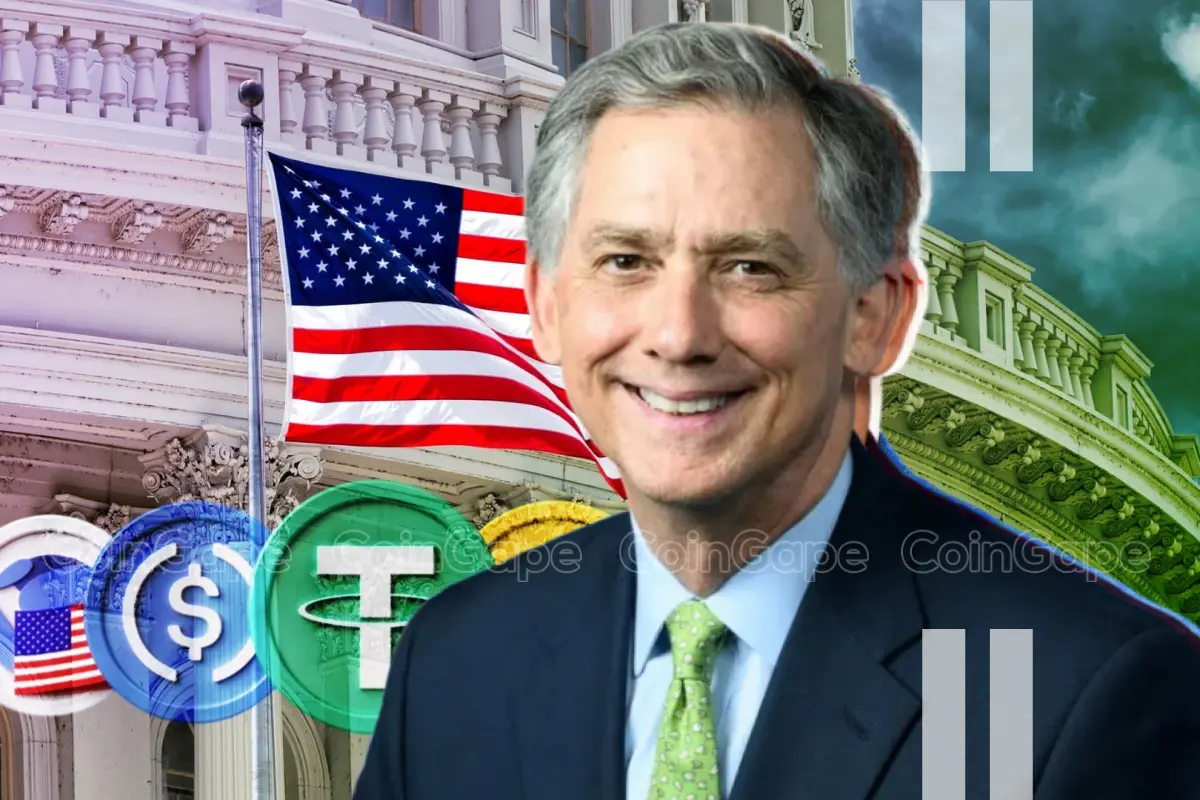Regulation
US Rep French Hill Reveals Plan To Investigate Operation Chokepoint 2.0

US Representative French Hill has outlined a plan to thoroughly investigate Operation Chokepoint 2.0, a campaign allegedly targeting industries like digital assets. Hill emphasizes regulatory fairness, transparency, and proportionate oversight, seeking to reverse politically motivated debanking practices under the current administration.
French Hill Vows To Investigate Operation Chokepoint 2.0 Debanking Practices
Rep. French Hill has publicly committed to investigating Operation Chokepoint 2.0, a campaign accused of politically targeting industries by denying them access to financial services. Hill stated that financial institutions should not terminate customer accounts without valid, material reasons, framing such actions as weaponization of government resources.
He underscored the importance of fairness and transparency in financial regulations, calling the practice detrimental to lawful businesses.
In a recent social media post, Hill condemned the continuation of these practices under the Biden-Harris administration, citing parallels to the original Operation Choke Point. He announced his intention to push for legislative scrutiny of the actions and policies of regulatory agencies to determine their adherence to legal standards. In addition, Hill expressed a strong stance on eliminating what he described as political targeting in financial oversight.
The US Congressman emphasized,
“There should be no place for politicized debanking of legal businesses in the American financial system. I plan to fully investigate “Operation Choke Point 2.0”.
Moreover, Charles Hoskinson reiterated French Hill’s call for transparency and fairness in financial regulations, emphasizing urgent legislation to protect crypto businesses from Operation Chokepoint 2.0. He urged collaborative action to prevent further economic and emotional harm to the industry.
Regulatory Tailoring and Optional Climate Stress Tests
More so, French Hill emphasized the importance of tailoring financial oversight to individual institutions as part of his broader reform plan. Hill proposed requiring federal prudential regulators to consider factors such as size, risk profile, and business model when implementing policies. This approach will prevent one-size-fits-all regulations and ensure that smaller community banks and credit unions are not unfairly burdened.
Hill also advocated for making climate stress testing optional for financial institutions. He argued that climate-related risks should be assessed within existing frameworks like credit and operational risk evaluations. This practice will eliminate the need for overlapping mandates.
Industry Leaders Join Calls for Action
Meanwhile, the remarks by French Hill align with calls from industry figures for more transparency and fairness in financial regulations. Coinbase Chief Policy Officer Faryar Shirzad recently urged enhanced public disclosure regarding regulatory actions.
However, Faryar Shirzad expressed optimism about the swift passage of pro-crypto legislation under Donald Trump’s administration. He highlighted the presence of a historically pro-crypto Congress, with Republicans controlling both the Senate and the House. Shirzad expects key bills, such as the FIT 21 Crypto Bill and the Clarity for Payment Stablecoins Act, to advance rapidly.
In Barbados, entrepreneur Gabriel Abed shared his experience of being debanked by First Citizens Caribbean Bank after a Bitcoin-related deposit. Similar cases illustrate the broader challenges facing businesses in the digital asset space. More so, Hoskinson called on the crypto industry to collaborate and advocate for laws to prevent such practices.
Disclaimer: The presented content may include the personal opinion of the author and is subject to market condition. Do your market research before investing in cryptocurrencies. The author or the publication does not hold any responsibility for your personal financial loss.
Regulation
Donald Trump Picks Paul Atkins As Next US SEC Chair

US President-elect Donald Trump has picked pro-crypto Paul Atkins as the next chair of the US Securities and Exchange Commission. Atkins will replace the current US SEC chair, Gary Gensler, who will resign on January 20, the same day Trump becomes president.
Donald Trump Picks Paul Atkins For US SEC Chair Role
In a post on the Truth Social platform, Donald Trump announced that he was nominating pro-crypto Paul Atkins for the US SEC chair role. The US president-elect mentioned that Atkins is a proven leader for “common sense” regulations.
Trump also alluded to the crypto industry, noting that Atkins also recognizes that digital assets and other innovations are critical to making America greater than ever.
This development comes after weeks of speculation, during which names like Robinhood Chief Legal Officer (CLO) Dan Gallagher had come up as potential candidates to succeed Gensler. However, Dan Gallagher stepped out of the race when he clarified that he didn’t want the job.
Meanwhile, Paul Atkins’ nomination will undoubtedly delight individuals like pro-XRP lawyer John Deaton, who endorsed him for the job.
Disclaimer: The presented content may include the personal opinion of the author and is subject to market condition. Do your market research before investing in cryptocurrencies. The author or the publication does not hold any responsibility for your personal financial loss.
Regulation
Australia Crypto Industry Slams ASIC Digital Asset Regulation Draft Changes

The Australian Securities and Investments Commission (ASIC) released a new consultation paper while providing key updates to the digital assets guidance and related financial products. With this update, the regulator seeks to provide greater clarity on how the existing financial product definition applies to crypto, and can be part of the digital asset regulation. However, some crypto industry experts slammed the move saying that it will benefit only big businesses and push small players out of the market.
Australia’s ASIC Seeks Feedback on Crypto Guidance
Australia’s top financial regulator ASIC released Consultation Paper 381 (CP 381) earlier today outlining the updates to Information Sheet 225 (INFO 225) regarding (IETH) and related financial products. These products will provide clarity on how some of the traditional market rules are also applicable to digital assets.
ASIC Commissioner Alan Kirkland emphasized the importance of balancing responsible financial innovation with consumer protection. He said:
“We want to promote the growth of responsible financial innovation while ensuring consumer protection. A well-regulated financial system benefits everyone in the community as it supports consumer confidence, market integrity and facilitates competition and innovation”.
Kirkland also noted that Australia’s regulatory regime is broad as well as technology-neutral allowing digital assets to accommodate within the existing framework for financial products. Furthermore, ASIC is seeking feedback on key issues which include:
- The application of existing financial services licensing processes to digital asset businesses.
- The regulatory challenges related to wrapped tokens and stablecoins.
- The potential for regulatory relief for businesses transitioning to new regimes.
Furthermore, ASIC noted that it would consult on these updates until February 28, 2025. The regulator will publish a final version of INFO 225 in mid-2025 after considering the feedback received.
Moreover, it would also continue to use its regulatory tools to protect consumers and maintain market integrity within the digital asset space. These guidelines will also be applicable to some of the top crypto exchanges in Australia.
Crypto Industry Experts Slam the Move
Crypto industry experts stated that compliance will no longer be optional under the new regulatory rules and market players are likely to have a close look at it. There have also been growing concerns that ASIC’s draft guidance could leave crypto startups vulnerable, potentially driving an exodus of firms from Australia.
Crypto lawyer Joni Pirovich commented on LinkedIn that the updated guidance could make launching a crypto business in Australia “as costly as, or even more expensive than, launching offshore”. She added:
“From a timing perspective, Australian innovators that want to launch now will likely do so offshore. Those that are based here face a significant step up in compliance costs”.
Liam Hennessy, a partner at Clyde and Co law firm, also echoed similar thoughts on this. He said: “Obviously, the bigger businesses will be better able to withstand all of that regulation, all of that legal cost, compliance cost that is associated with it. Smaller businesses may struggle”.
However, he also appreciated the move towards greater regulatory clarity. Hennessy said: “It is a significant piece of regulatory guidance to the market. Anything which gives regulatory clarity is a good thing for the market.”
The Changing Digital Assets Regulation and Landscape
Australia’s digital assets landscape has been changing amid global developments and the emergence of crypto ETFs in the market. As part of the region’s improving clarity on digital asset regulation, asset manager Monochrome launched its Ethereum ETF (IETH) amid the rising demand growth in the local market. Crypto investment products have been also gaining traction amid changes in the global regulatory market and rising acceptance.
Looking at the regulatory development, crypto firms are also looking to expand in Australia. Circle has announced the expansion of its USDC stablecoin operations into Australia while collaborating with venture capitalist Mark Carnegie’s MHC Digital Group. The partnership aims to leverage the robust financial infrastructure of Australia enhancing the utility and accessibility of USDC in the region.
Disclaimer: The presented content may include the personal opinion of the author and is subject to market condition. Do your market research before investing in cryptocurrencies. The author or the publication does not hold any responsibility for your personal financial loss.
Regulation
Bitcoin Jesus Roger Ver Fights US Indictment Alleging Tax Evasion: Details

Roger Ver, recognized in the crypto community as “Bitcoin Jesus,” is contesting an eight-count indictment brought by the U.S. Attorney for the Central District of California. Ver, known for his early investments in Bitcoin and advocacy for digital assets, is accused of failing to report $50 million in taxes on Bitcoin transactions valued at $240 million in 2017.
Additional charges allege that Ver underrepresented the value of his businesses during his 2014 renunciation of U.S. citizenship to avoid higher exit taxes.
Roger Ver Fights Tax Evasion Charges
According to FOX Business, Roger Ver is challenging allegations that he evaded paying $50 million in taxes on substantial Bitcoin sales in 2017. Prosecutors claim Ver also underreported the value of two companies he owned, MemoryDealers US and Agilestar, when he expatriated in 2014.
Allegedly, the underreporting allowed him to avoid a higher exit tax, a levy imposed on unrealized capital gains for individuals relinquishing U.S. citizenship.
Ver’s legal team, comprising attorneys from prominent law firms Steptoe LLP and Kimura London & White, filed a motion to dismiss the indictment. The motion argues that the Justice Department engaged in unconstitutional government overreach and selectively withheld key evidence. It also claims the actions violated Ver’s right to due process.
The filing includes correspondence between Ver and his attorneys, indicating his efforts to ensure compliance with crypto tax regulations at the time.
Allegations of Government Overreach and Communication Misuse
Roger Ver’s legal representatives contend that prosecutors improperly obtained privileged attorney-client communications and used them to build their case. These communications include detailed emails in which Ver sought professional advice to meet his tax obligations, even under ambiguous guidelines.
The legal team also claims that the indictment reflects selective enforcement against Roger Ver, a vocal critic of U.S. cryptocurrency regulations. The motion claims crypto tax rules during Ver’s expatriation were unclear, making criminal charges unwarranted.
Furthermore, the attorneys assert that the government’s actions violate core constitutional protections for individuals seeking to renounce citizenship.
More so, Ver’s defense argue that crypto tax regulations were insufficiently defined at the time of his alleged offenses. The IRS began issuing guidance on virtual assets as property in late 2014, after Ver had renounced his U.S. citizenship.
His legal team maintains that Roger Ver relied on attorneys and accountants to comply with all applicable laws. In an email correspondence dated April 2013 and included in the filing, Ver expressed to his lawyer,
“I want to make sure that my exit tax payments are as clean as possible, with no room to have trouble from the IRS in the future.”
Moreover, emails reveal that Ver’s advisors recommended obtaining third-party appraisals to address the difficulty of valuing Bitcoin accurately, given the low market liquidity in 2014. The defense further argues that any discrepancies were unintentional and do not warrant criminal prosecution.
The motion to dismiss is being reviewed by the U.S. District Court for the Central District of California. Ver’s attorneys express optimism that the incoming Trump administration, may influence the case’s outcome.
Disclaimer: The presented content may include the personal opinion of the author and is subject to market condition. Do your market research before investing in cryptocurrencies. The author or the publication does not hold any responsibility for your personal financial loss.
-

 Market16 hours ago
Market16 hours agoHedera (HBAR) Price Surges 721%, Surpassing $13B Market Cap
-

 Market20 hours ago
Market20 hours agoSUI Price Nears All-Time High After 97% Monthly Surge
-

 Market11 hours ago
Market11 hours agoWill Cardano Whales Continue to Sell Ahead of Token Unlock?
-

 Altcoin11 hours ago
Altcoin11 hours agoPepe Coin Whales Accumulation Signals 7x Gains For PEPE Looms
-

 Market23 hours ago
Market23 hours agoCrypto price predictions: HBAR, iDEGEN, Bitcoin
-

 Altcoin23 hours ago
Altcoin23 hours agoBitcoin Price Prediction: Here’s How High Shiba Inu (SHIB) And ETFSwap (ETFS) Will Go When BTC Hits $120,000
-

 Market22 hours ago
Market22 hours agoFantom (FTM) Price Gains Strength From Bullish Market Trends
-

 Market15 hours ago
Market15 hours agoEthereum Price Holds Steady, $4K Remains The Goal





















✓ Share: